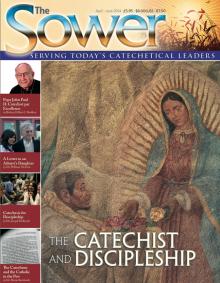The etymology of “discipleship” has something to say about its meaning for today’s catechist.
The word “disciple” came into Old English some time after the first half of the seventh century, borrowed from the Latin word “discipulus” or “pupil”, as the Anglo-Saxon community was Christianised and as learning and Church reform spread[i]. The Indo-European root of this word, “*dek-”, seems to have entered Attic Greek as “didaskein”, “to teach”, and then travelled through the Roman world, as the closely related Latin “docere”, “to teach”, and “discere”, “to learn”. Once the word root reached Wales it had mutated to “dysgu”, a word that confounds in simultaneously holding both these meanings. This Welsh usage may point the way to an appropriate humility.
However, it is apt that “disciple” was adopted, rather than “pupil”, derived from the Latin “pūpillus”, as this could also be translated as “ward” or “orphan”[ii]. Christ teaches the faithful to pray to their Father[iii] and that they will not be left as orphans[iv], while to enter the Kingdom of God they should be as little children[v].
The rest of this online article is available for current Guild members.
This article is from The Sower and may be copied for catechetical purposes only. It may not be reprinted in another published work without the permission of Maryvale Institute. Contact [email protected]

















